
Topics
After nationalizing the oil industry Iranian Prime Minister Mohammad Mossadegh was overthrown in a coup orchestrated by the CIA and British intelligence. We speak with Stephen Kinzer author of All the Shah’s Men: An American Coup And The Roots of Middle East Terror and Baruch College professor Ervand Abrahamian. [Includes transcript]
Click here to read to full transcript This month marks the 50th anniversary of America’s first overthrow of a democratically-elected government in the Middle East.
In 1953, the CIA and British intelligence orchestrated a coup d’etat that toppled the democratically elected government of Iran. The government of Mohammad Mossadegh. The aftershocks of the coup are still being felt.
In 1951 Prime Minister Mossadegh roused Britain’s ire when he nationalized the oil industry. Mossadegh argued that Iran should begin profiting from its vast oil reserves which had been exclusively controlled by the Anglo-Iranian Oil Company. The company later became known as British Petroleum (BP).
After considering military action, Britain opted for a coup d’état. President Harry Truman rejected the idea, but when Dwight Eisenhower took over the White House, he ordered the CIA to embark on one of its first covert operations against a foreign government.
The coup was led by an agent named Kermit Roosevelt, the grandson of President Theodore Roosevelt. The CIA leaned on a young, insecure Shah to issue a decree dismissing Mossadegh as prime minister. Kermit Roosevelt had help from Norman Schwarzkopf’s father: Norman Schwarzkopf.
The CIA and the British helped to undermine Mossadegh’s government through bribery, libel, and orchestrated riots. Agents posing as communists threatened religious leaders, while the US ambassador lied to the prime minister about alleged attacks on American nationals.
Some 300 people died in firefights in the streets of Tehran.
Mossadegh was overthrown, sentenced to three years in prison followed by house arrest for life.
The crushing of Iran’s first democratic government ushered in more than two decades of dictatorship under the Shah, who relied heavily on US aid and arms. The anti-American backlash that toppled the Shah in 1979 shook the whole region and helped spread Islamic militancy.
After the 1979 revolution President Jimmy Carter allowed the deposed Shah into the U.S. Fearing the Shah would be sent back to take over Iran as he had been in 1953, Iranian militants took over the U.S. embassy–where the 1953 coup was staged–and held hundreds hostage.
The 50th anniversary of the coup was front-page news in Iranian newspapers. The Christian Science Monitor reports one paper in Iran publishing excerpts from CIA documents on the coup, which were released only three years ago.
The U.S. involvement in the fall of Mossadegh was not publicly acknowledged until three years ago. In a New York Times article in March 2000, then-Secretary of State Madeleine Albright admitted that “the coup was clearly a setback for Iran’s political development. And it is easy to see now why many Iranians continue to resent this intervention by America in their internal affairs.”
In his book All the Shah’s Men, Kinzer argues that “[i]t is not far-fetched to draw a line from Operation Ajax [the name of the coup] through the Shah’s repressive regime and the Islamic Revolution to the fireballs that engulfed the World Trade Center in New York.”
- Stephen Kinzer, author All the Shah’s Men, An American Coup And The Roots of Middle East Terror
- Prof. Ervand Abrahamian, Middle East and Iran Expert at Baruch College, City University of New York . Author of numerous book including Khomeinism: Essays on the Islamic Republic (University of California Press, 1993).
TRANSCRIPT
AMY GOODMAN: Well, it’s good to have you with us. Stephen Kinzer, why don’t we begin with you. This month, August 2003, 50 years ago, the C.I.A. orchestrated a coup against the democratically elected government of Mohammad Mossadegh. Can you briefly tell us the story of how this took place?
STEPHEN KINZER: This was a hugely important episode, and looking at it from the prospective of history, we can see that it really shaped a lot of the 50 years that have followed since then in the Middle East and beyond. But yet, it’s an episode that most Americans don’t even know happened. As I was writing my book, I had the sense that I was dredging up an incident that had been largely forgotten. During my work, I realized early on that Mossadegh, the prime minister of Iran, had been the Man of the Year for Time magazine in 1951. And after I realized that, I went to some trouble and I finally located a copy of that Time magazine. And I framed it, and I have it up on my wall. And it gave me the feeling that, not only am I digging up this episode again, but I’m bringing back to life this figure of Mossadegh. He was really a huge figure in the world of mid-century. This was a time, bear in mind, before the voice of the Third World, as we now call it, had ever really been raised in world councils. This was a time before Castro, before Nkrumah, before Sukharno, before Nasser. Mossadegh actually showing up in New York and laying out Iran’s case and by extension the case of poor nations against rich nations was something very, very new for the whole world. And what a figure he was. This book is full of amazing characters. Not just Kermit Roosevelt, the guy who planned the coup. But Mossaugh—tall, sophisticated, European-educated aristocrat—but also highly emotional, a guy who would start sobbing and sometimes even faint dead away in Parliament when giving speeches about the suffering of the Iranian people. When he embraced the national cause of that period, which was the nationalization of the Anglo-Iranian Oil Company, he set himself on a collision course with the great powers in the world. And that collision has produced effects which we’re still living with today.
AMY GOODMAN: Talk about the Anglo- Iranian Oil Company.
STEPHEN KINZER: The Anglo-Iranian Oil Company arrived in Iran in the early part of the twentieth century. It soon struck the largest oil well that had ever been found in the world. And for the next half-century, it pumped out hundreds of millions of dollars worth of oil from Iran. Now, Britain held this monopoly. That meant it only had to give Iran a small amount—it turned out to be 16 percent—of the profits from what it produced. So the Iranian oil is actually what maintained Britain at its level of prosperity and its level of military preparedness all throughout the '30s, the ’40s, and the ’50s. Meanwhile, Iranians were getting a pittance, they were getting almost nothing from the oil that came out of their own soil. Naturally, as nationalist ideas began to spread through the world in the post-World War II era, this injustice came to grate more and more intensely on the Iranian people. So they carried Mossadegh to power very enthusiastically. On the day he was elected prime minister, Parliament also agreed unanimously to proceed with the nationalization of the oil company. And the British responded as you would imagine. Their first response was disbelief. They just couldn't believe that someone in some weird faraway country—which was the way they perceived Iran—would stand up and challenge such an important monopoly. This was actually the largest company in the entire British Empire. When it finally became clear that Mossadegh was quite serious, the British decided to launch an invasion. They drew up plans for seizing the oil refinery and the oil fields. But President Truman went nuts when he heard this and he told the British, under no circumstances can we possibly tolerate a British invasion of Iran. So then the British went to their next plan, which was to get a United Nations resolution demanding that Mossadegh return the oil company. But Mossadegh embraced this idea of a U.N. debate so enthusiastically that he decided to come to New York himself and he was so impressive that the U.N. refused to adopt the British motion. So finally, the British decided that they would stage a coup, they would overthrow Mossadegh. But what happened, Mossadegh found out about this and he did the only thing he could have done to protect himself against the coup. He closed the British embassy and he sent all the British diplomats packing, including, among them, all the secret agents who were planning to stage the coup. So now, the British had to turn to the United States. They went to Truman and asked him, please overthrow Mossadegh for us. He said no. He said the C.I.A. had never overthrown a government and, as far as he was concerned, it never should. So, now, the British were completely without resources. They couldn’t launch an invasion, the U.N. had turned down their complaint, they had no agents to stage a coup. So they were stymied. It wasn’t until November of 1952 when British foreign office and intelligence officials received the electrifying news that Dwight Eisenhower had been elected president that things began to change. They rushed one of their agents over to Washington. He made a special appeal to the incoming Eisenhower administration. And that administration reversed the Truman policy agreed to send Kermit Roosevelt to Tehran to carry out this fateful coup.
AMY GOODMAN: When we come back from our break, we’ll find out just what Kermit Roosevelt, the grandson of Teddy Roosevelt, and Norman Schwarzkopf, the father of the man who led the Persian Gulf War, Norman Schwarzkopf, did in Iran. Stay with us. We’re talking to Stephen Kinzer. He’s author of All the Shah’s Men: An American Coup and the Roots of Middle East Terror. [¶MUSIC BREAK¶]
AMY GOODMAN: You are listening to Democracy Now!, the War and Peace Report. I’m Amy Goodman on this 50th anniversary of the C.I.A.-backed coup that overthrew the democratically elected prime minister of Iran, Mohammad Mossadegh. We’re talking to Stephen Kinzer. He is author of a new book, All the Shah’s Men: An American Coup and the Roots of Middle East Terror. In a minute, we’re going to go to old film about the coup where former C.I.A. agents talk about their role in it. But talk about the man in the C.I.A. who spearheaded this, Kermit Roosevelt.
STEPHEN KINZER: One of the reasons I wanted to write this book was because I’ve always been curious about exactly how you go about overthrowing a government. What do you do after you choose an agent and assign a lot of money? Exactly how do you go about doing it? Kermit Roosevelt really is a wonderful way to answer that question. What happened was this: Kermit Roosevelt, who as you said was Teddy Roosevelt’s grandson, was the Near East director for the C.I.A. He slipped clandestinely into Iran just around the end of July 1953. He spent a total of less than three weeks in Iran—that’s only how long it took him to overthrow the government of Mossadegh. And one thing that I did realize as I was piecing together this story is how easy it is for a rich, powerful country to throw a poor, weak country into chaos. So what did Roosevelt do? The first thing he did was he wanted to set Tehran on fire. He wanted to make Iran fall into chaos. So he bribed a whole number of politicians, members of Parliament, religious leaders, newspaper editors and reporters, to begin a very intense campaign against Mossadegh. This campaign was full of denunciatory speeches and lies about Mossadegh, dated and passed, without bitter denunciations of Mossadegh from the pulpits and in the streets, on the houses of Parliament. Then, Roosevelt also went out and bribed leaders of street gangs. You had a kind of “Mobs 'R' Us,” mobs-for-hire, kind of situation existing in Iran that that time. Roosevelt got in touch with the leaders of these mobs. Finally, he also bribed a number of military officers who would be willing to bring their troops in on his side at the appropriate moment. So when that moment came, the fig leaf of the coup was, as you said, this document that the Shah had signed, rejecting the prime ministership of Mossadegh, essentially firing him from office. Now, this was a decree that was of very dubious legality since in democratic Iran only the Parliament could hire and fire prime ministers. Nonetheless, the idea was that this decree would be delivered to Mossedegh at his house at midnight one night and then, when he refused to obey it, as he probably would, he would be arrested. That was the plot. But what happened was that the officer that Kermit Roosevelt had chosen to go to Mossdegh’s house at midnight, presented the decree firing Mossadegh and preparing to arrest him but other, loyal soldiers stepped out of the shadows and arrested him. The coup had been betrayed. The plot failed. The man who was supposed to arrest Mossadegh was himself arrested. And Kermit Roosevelt woke up the next day with a cable from his superiors in the C.I.A. telling him, My God, you failed, you better get out of there right away before they find you and kill you. But Kermit Roosevelt, on his own, decided that he would stay. He figured, I can still do this, I was sent here to overthrow this government, I’m going to make up my own plan.
AMY GOODMAN: Now he had had help before from Norman Schwarzkopf, is that right, Schwarzkopf’s father?
STEPHEN KINZER: There’s a fantastic cast of characters in this story and one of them is Norman Schwarzkopf, who had been the head of the investigation into the Lindhburg kidnapping while with the New Jersey state police, had spent many years in Iran during the 1940s, and was a very flamboyant figure with great influence on the Shah. He was one of the people that Kermit Roosevelt brought in to pressure the timid Shah into signing this fateful decree. Now, the decree finally failed to have its desired effect, as I said. And then Roosevelt on his own devised this plan where, first of all, he sent rioters out into the streets to pretend that they were pro-Mossadegh. They were supposed to yell “I love Mossadegh and communism. I want a people’s republic!” and then loot stores, shoot into mosques, break windows, and generally make themselves repugnant to good citizens. Then he hired another mob to attack his first mob, thereby creating the impression that Iran was falling into anarchy. And finally on the climactic day, August 19, 1953, he brought all his mobs together, mobilized all of his military units, stormed a number of government buildings and then, in the climactic gunbattle at Mossadegh’s house, a hundred people were killed until finally the coup succeeded, Mossadegh had to flee and was later arrested, and the Shah, who had fled in panic at the first sign of trouble a few days earlier, returned in triumph to Tehran and began what became 25 years of increasingly brutal and repressive rule.
AMY GOODMAN: That issue of the U.S. government funding both the people in the streets who pretended that they were for Mossadegh but communist, and against Mossadegh, pro-Shah, I would like our guest, professor Ervand Abrahamian, Middle East and Iran expert at Baruch College, to comment on. This was a time, the British had used the ruse of anti-communism supposedly to lure in the U.S. Do you think the U.S. was fully well aware of the issue of oil being at the core of this, and also them possibly getting a cut of those oil sales.
ERVAND ABRAHAMIAN: Yes, I think oil is the central issue. But of course this was done at the height of the Cold War, so much of the discourse at the time linked it to the Cold War. I think many liberal historians, including of course Stephen Kinzer’s wonderful book here, even though it’s very good in dealing with the tragedy of the '53 coup, still puts it in this liberal framework that the tragedy, the original intentions, were benign.—that the U.S. really got into it because of the Cold War and it was hoodwinked into it by the nasty British who of course had oil interests, but the U.S. somehow was different. U.S. Eisenhower's interest, were really anti-communism. I sort of doubt that interpretation. For me, the oil was important both for the United States and for Britain. It’s not just the question of oil in Iran. It was a question of control over oil internationally. If Mossadegh had succeeded in nationalizing the British oil industry in Iran, that would have set an example and was seen at that time by the Americans as a threat to U.S. oil interests throughout the world, because other countries would do the same. Once you have control, then you can determine how much oil you produce in your country, who you sell it to, when you sell it, and that meant basically shifting power from the oil companies, both British Petroleum, Angloversion, American companies, shifting it to local countries like Iran and Venezuela. And in this, the U.S. had as much stake in preventing nationalization in Iran as the British did. So here there was not really a major difference between the United States and the British. The question really was on tactics. Truman was persuaded that he could in a way nudge Mossadegh to give up the concept of nationalization, that somehow you could have a package where it was seen as if it was nationalized but, in reality, power would remain in the hands of Western oil companies. And Mossadegh refused to go along with this facade. He wanted real nationalization, both in theory and practice. So the Truman administration, in a way, was not that different from the British view of keeping control. Then, the Truman policy was then, if Mossadegh was not willing to do this, then he could be shoved aside through politics by the Shah dismissing him or the Parliament in Iran dismissing him. But again, it was not that different from the British view. Where the shift came was that after July of ’52, it became clear even to the American ambassador in Iran that Mossadegh could not be got rid of through the political process. He had too much popularity, and after July ’53, the U.S. really went along with the British view of a coup, indeed to have a military coup. So even before Eisenhower came in, the U.S. was working closely with the British to carry out the coup. And what came out of the coup was of course the oil industry on paper remained Iranian, nationalized, but in reality it was controlled by a consortium. In that consortium the British still retained more than 50 percent, but the U.S. got a good 40 percent of that control.
AMY GOODMAN: I said at the top, this month marks the 50th anniversary of America’s first intervention in the Middle East. I should have said, of America’s first overthrow of a democratically elected government. But, Stephen Kinzer, the statement that you make in your book, it is not far-fetched to draw a line from Operation Ajax, which the U.S. had called the coup through the Shah’s repressive regime and the Islamic revolution to the fireballs that engulfed the World Trade Center in New York. Can you flush that out?
STEPHEN KINZER: The goal of our coup was to overthrow Prime Minister Mossadegh and place the Shah back in his throne. And we succeeded in doing that. But from the perspective of decades of history, we can look back and ask whether what seemed like a success really was a success. The Shah whom we brought back to power became a harsh dictator. His repression set off the revolution of 1979, and that revolution brought to power a group of fanatic anti-Western, religious clerics whose government sponsored acts of terror against American targets, and that government also inspired fundamentalists in other countries including next door, Afghanistan, where the Taliban came to power and gave sanctuary to Al Qaeda and Osama bin Laden. So, I think you can—while it’s always difficult to draw direct cause and effect lines in history—see that this episode has had shattering effects for the United States. And let’s consider one other of the many negative affects this has had. When we overthrew a democratic government in Iran 50 years ago, we sent a message, not only to Iran, but throughout the entire Middle East. That message was that the United States does not support democratic governments and the United States prefers strong-man rule that will guarantee us access to oil. And that pushed an entire generation of leaders in the Middle East away from democracy. We sent the opposite message that we should have sent. Instead of sending the message that we wanted democracy, we sent a message that we wanted dictatorship in the Middle East, and a lot of people in the Middle East got that message very clearly and that helped to lead to the political trouble we face there today.
AMY GOODMAN: Right after the Shah was deposed by the Ayatollah Khomeini and the Iranian revolution of 1979 and then the Iranian students took over the U.S. embassy, I’m wondering, Professor Abrahamian, how often did the press, and understanding through the hundreds of days that the hostages were held, go back to the 1953 coup and explain the fears of the students that in 1953 the Shah had fled thinking that the coup had been fought back and the U.S. brought him back and that now that Jimmy Carter had allowed him into the United States, that they might be staging another possible coup, leading the students to fear this and to take the hostages.
ERVAND ABRAHAMIAN: I think on this issue actually you see a big cultural gap between the American public and the Iranian public. For the Iranian public, the '53 coup shapes basically Iranian history, as Stephen shows very much in his book. But for Americans, the ’53 coup was something unreal for them. It wasn't something they were aware of. If they were aware it, it was like Jimmy Carter saying that this was ancient history. For the U.S. it may have been ancient history but for Iranians it was not. So when the students took over the embassy, they actually called it the “den of spies” because they knew that in ’53 the coup had been actually plotted from the U.S. compound. So they were—
AMY GOODMAN: That very building that they took over.
ERVAND ABRAHAMIAN: That very building. And that, for Iranians, was a central issue. In the United States, if you watch how the media covered it here, it saw the hostage crisis as Iranian emotional rampaging mobs in the streets calling for death of America and the ’53 coup was intentionally not brought into that context. So you can go for reams of programs on the main channels in the United States about the hostage crisis, which lasted 444 days, and you rarely get the mention of the ’53 coup. This was intentional. The media here did not want to make that link to ’53.
AMY GOODMAN: Well, we’re going to go right now back to an older documentary that very much lays out what happened in '53, with interestingly enough, former C.I.A. agents. I want to thank you, Professor Abrahamian, for being with us from Baruch College, and Steven Kinzer, author of the new book, _All the Shah's Men: An American Coup and the Roots of Middle East Terror._ Stay with us.

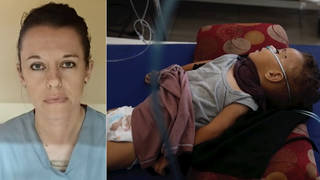
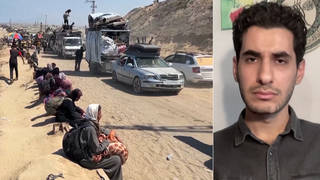
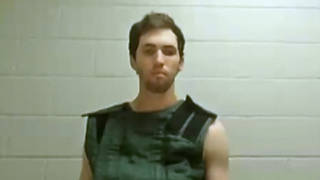
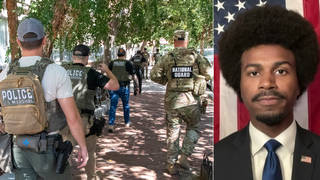





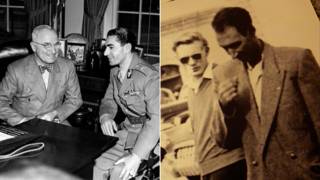
Media Options